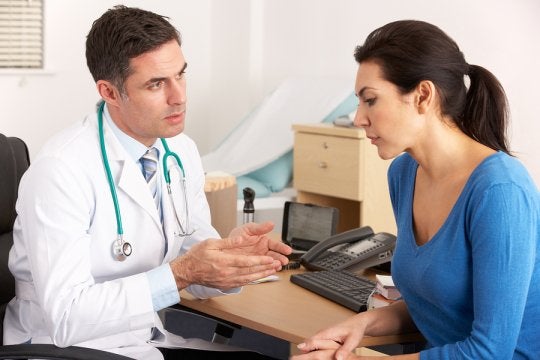-
The STD Testing Process
In most cases, early STD treatment helps to prevent long-term complications, so it is important to talk to your gynecologist about STD testing. Your gynecologist will ask you questions about your sexual health history and current relationships to determine what type of STD testing is right for you.
Watch this video to learn more about STD testing. Most tests can be completed simply by taking a small sample of cells, examining any vaginal discharge that is present, or performing a blood or urine test.
For STD testing in Washington, D.C., visit Washington Surgi-Clinic . We offer fast, confidential women’s health services, including STD testing and treatment. To make an appointment, please call (202) 659-9403.
-
When to Get STD Tested
Sexually transmitted diseases, or STDs, are diseases that can pass from one partner to another during sex. STD testing is fast and easy, and typically only requires a blood sample, urine sample, or small tissue sample, such as a pap smear. There are several reasons to schedule STD testing, such as seeing a new sexual partner or engaging in sexual activities with several partners. Additionally, if you have had unprotected sex with a partner that has not undergone recent STD testing, it’s also a good idea to contact your gynecologist for an STD test. Because many sexually-transmitted diseases do not cause immediate or noticeable symptoms, it’s important to get tested even if you have not developed any new or concerning symptoms. Even if you are in a monogamous relationship, you may still wish to get tested once a year during your gynecological exam for convenience.

Washington Surgi-Clinic offers STD testing and STD treatment as part of our gynecology services near Washington, D.C., including testing for chlamydia, gonorrhea, syphilis, herpes, and HIV. You can learn more about STD testing, birth control, and reproductive health on our website, or call (202) 659-9403 to speak with a staff member today.
-
A Look at Common STDs
Sexually transmitted diseases (STDs) are quite common among both women and men. Even if you do not experience any of the possible symptoms of an STD, it is still possible to have one. To protect yourself, your gynecologist is likely to recommend using a barrier method of birth control, such as condoms, even if you are already using another birth control method. It’s also advisable to talk to a gynecologist about STD testing and whether it might be appropriate for you.

Human Papilloma Virus (HPV)
Almost every sexually active individual will acquire HPV at some point. There are many different types of HPV . An individual can contract HPV through skin-to-skin contact, as well as vaginal, anal, and oral sex. Some types of HPV do not cause health problems, while others can cause genital warts. It is also possible to develop cervical, vaginal, vulvar, anal, and oropharyngeal cancers from an HPV infection. You can talk to your gynecologist about having an HPV test, which is often done in the same appointment as a pelvic exam and Pap test.
Chlamydia
Another common STD is chlamydia, which is a bacterial infection that may not cause symptoms. When symptoms do occur, they typically develop within one to three weeks of infection. Women may experience abnormal vaginal discharge, bleeding between periods, and painful urination. Although chlamydia is easily treatable with antibiotics, it can lead to severe complications if left untreated. The infection can cause permanent damage to the reproductive system, which may lead to infertility. Chlamydia also increases the risk of an ectopic pregnancy.
Herpes
Herpes is a viral infection caused by the herpes simplex virus type one (HSV-1) and type two (HSV-2). This virus can affect the mouth or genitals, causing oral herpes and genital herpes, respectively. It’s not uncommon to have the herpes virus and not experience any symptoms. However, people with oral herpes may notice cold sores around the mouth. Those with genital herpes may notice blister-like sores on the genital area, including the buttocks. The sores may be painful and itchy. A gynecologist can prescribe medications to manage a herpes infection.
Washington Surgi-Clinic upholds the utmost standards of patient confidentiality. For information on STD treatment near Washington, D.C ., visit our website or call (202) 659-9403. Our gynecology services also include safe, legal pregnancy termination.
Recent Posts
Popular Posts
categories
- Uncategorized
- STD
- Washington Surgi-Clinic
- Abortion
- Pregnancy
- Pap Smears
- Birth Control Options
- HPV
- Gynecologist
- Pregnancy Test
- Abortion Safety
- IUD
- Pregnancy Termination
- First Trimister
- Cervical Cancer
- Morning After Pill
- Birth Control Pills
- Chlamydia
- Birth Control Shot
- Gonorrhea
- STD Testing
- Birth Control Implant
- Pelvic Pain
- Birth Control Patch
- HIV
- HPV Vaccine
